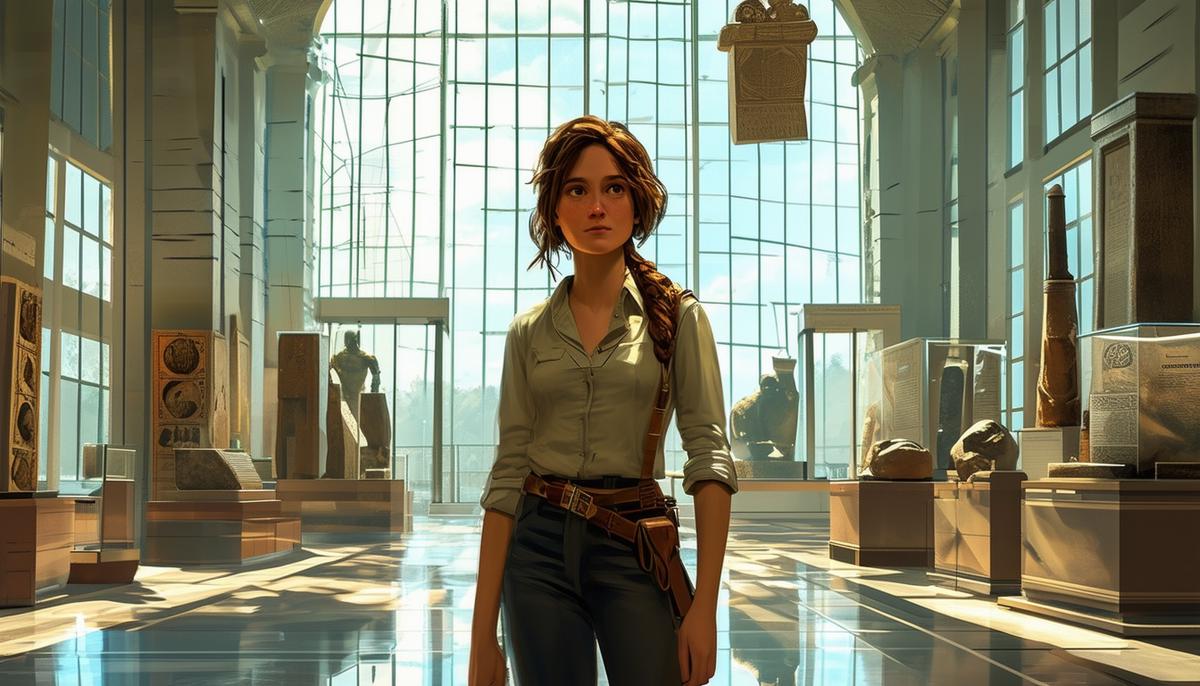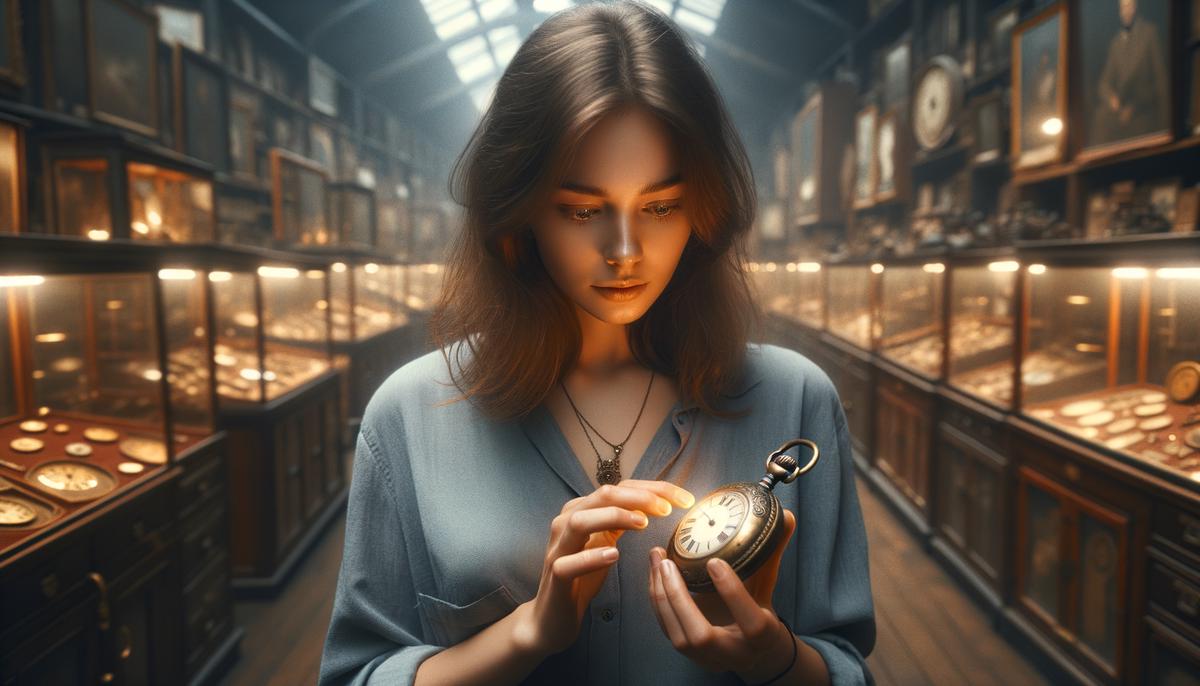A Quiet Life Disrupted
Sarah sighed as she opened the museum door. Each day felt the same: unlock, check humidity, and catalog artifacts. As the curator in Webster's Grove, she was both respected and underestimated.
Her cluttered workspace held many strange items. Today, a tarnished pocket watch caught her eye. It came with no info, just a note saying Found in an attic.
Sarah traced the engravings on its surface.
"This thing has more mysteries than half the town," she muttered.
Sarah wished something extraordinary would break the monotony. That night, as she locked up, she felt a subtle shift. Looking around, the streets were as sleepy as ever.
She went to bed unaware that soon, her orderly life would be changed by glimpses into other times. The pocket watch sat silently in the museum, waiting to change everything.
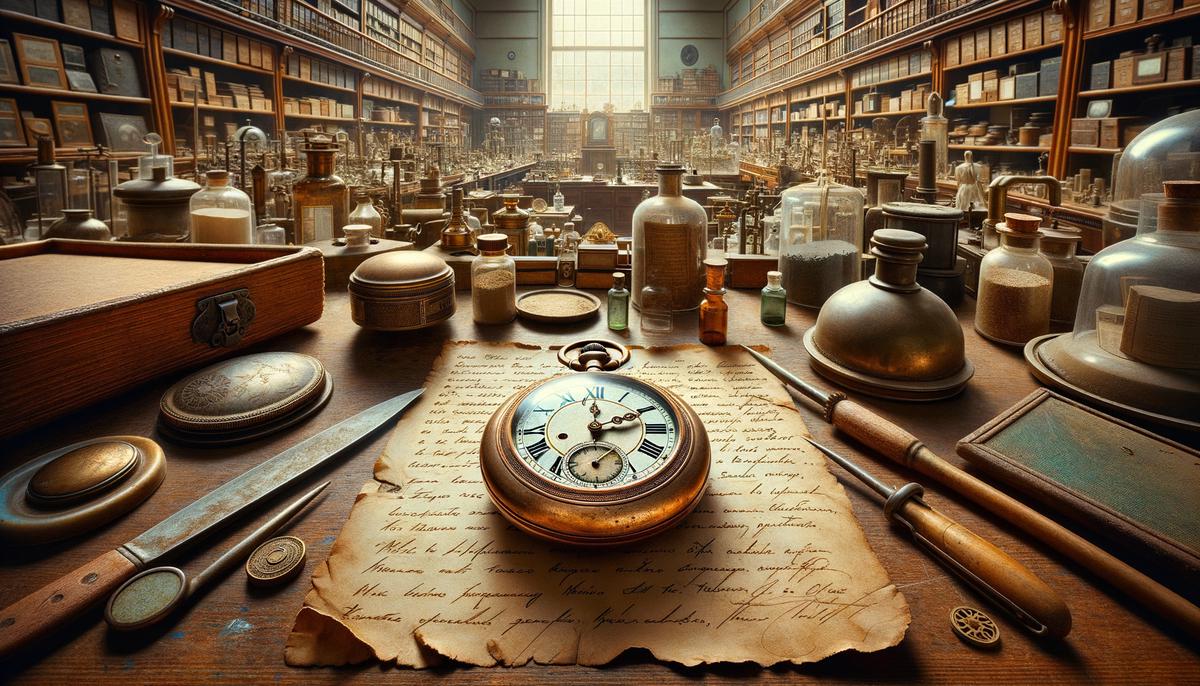
The Watch Awakens
Sarah's dreams that night were vivid. She saw fields, forests, and castles. Faces seemed to call to her, their voices faint.
At the museum, her eyes sought the pocket watch. It seemed to wink at her. She spent the day researching, but found no answers.
As evening neared, she noticed a hidden inscription: "Tempus corrigere" – Latin for Time to correct.
She twisted the watch's knob. The air rippled, and the room blurred. Suddenly, she was in a forest like the one from her dreams.
Sarah explored, finding an old cabin. An elderly man opened the door, nodding at the watch.
"Welcome," he said. "I see you've found the watch. There is much I need to tell you."
And so, Sarah's journey into the mysteries of the pocket watch began.

The First Time Slip
That night, Sarah turned the watch's knob again. The world blurred, and she found herself in Victorian London.
The busy streets were filled with people, horses, and carriages. Sarah was amazed by the sights, sounds, and smells of the past.
She ducked into an alley to catch her breath. The watch felt warm in her hand, urging her on.
Sarah found a bookshop called Aldgate Antiquities.
Inside, she showed the watch to the shopkeeper.
"Ah, a Tempus corrigere!" he said. "These are very rare, said to have time-traveling abilities."
He shared stories of others who had used such watches. Sarah realized her ordinary life had become an extraordinary adventure.
As she left the shop, Sarah felt ready to face whatever wonders—or dangers—lay ahead.
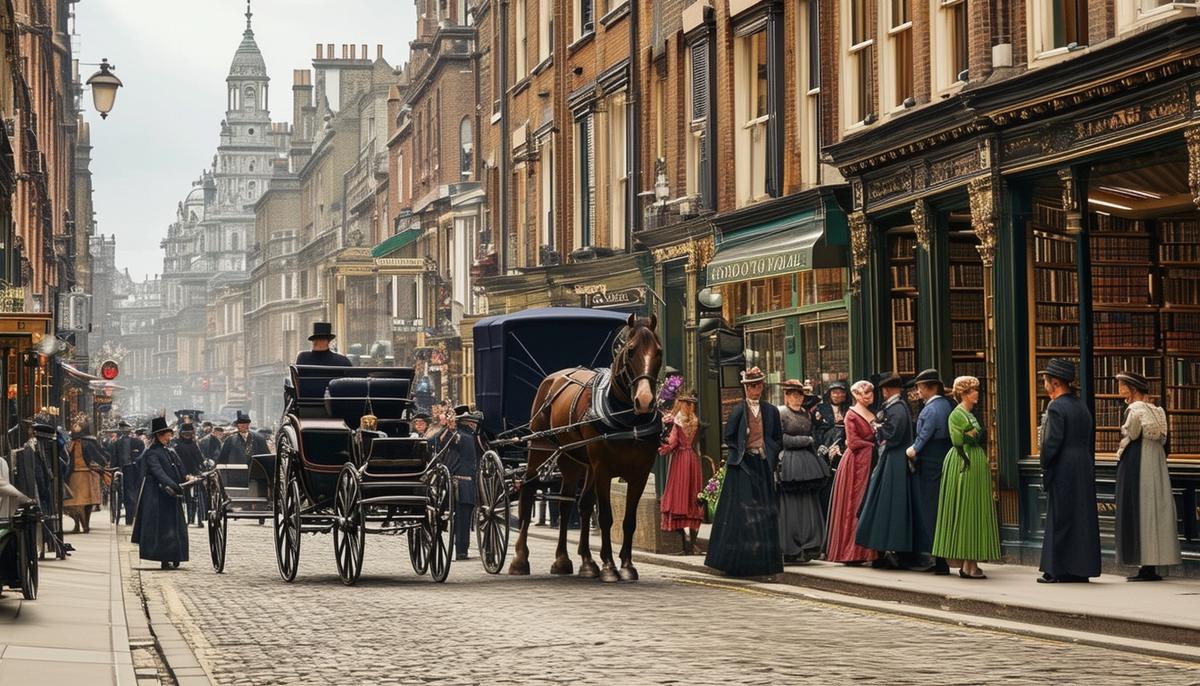
Sarah slumped into her chair as the Victorian London scene faded away. Her fingers still held the now-cool pocket watch. Amazed, she opened a notebook and frantically wrote down everything about her strange journey.
She searched online for info about time-traveling watches but found only vague stories. Sarah reached out to historians, and soon met with Dr. Tom Whittaker, an expert in weird historical events.
The Tempus Corrigere
In his dusty office, Dr. Whittaker showed Sarah an old book. "An Italian alchemist named Leonardo Boschi wrote about a device that lets people travel through time," he explained. "It responds to the user's will and curiosity, but it's dangerous." Boschi's warning echoed in Sarah's mind:
"To mess with time is to fight with forever."
Back at the museum, Sarah studied Boschi's writings. She realized each time slip was guided by her thoughts and feelings. Over weeks, she visited:
- Renaissance Florence
- A medieval village
- A scary future at war
Sarah carefully documented each trip. She knew the pocket watch was powerful and potentially risky. With every journey, she gathered information, saving it for the future – hers or anyone else who might find the watch.
The Tempus corrigere was more than just an object. It showed how much humans want to understand and control time. Sarah knew her adventure was only beginning – an endless exploration of history itself.
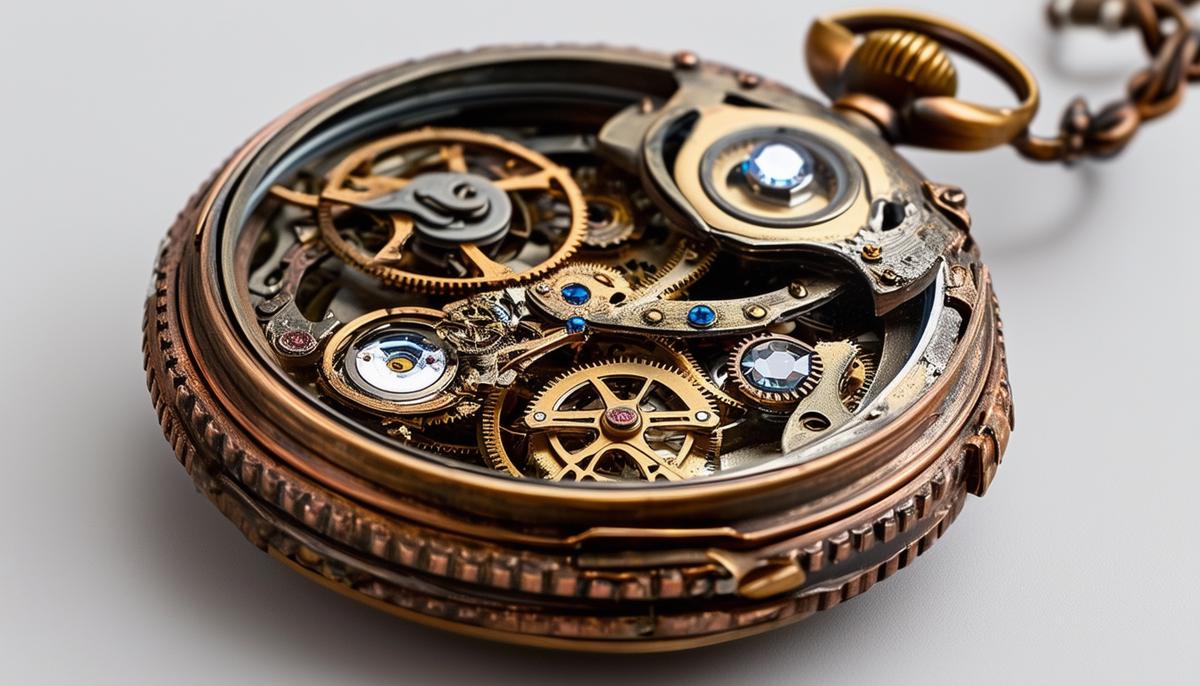
After meeting Dr. Whittaker, Sarah had many time trips. Each one made her more curious about history. One morning, she found herself in London in 1843, during the Industrial Revolution.
Sarah saw a young man writing in a notebook. It was Charles Dickens! She bravely went to talk to him.
A Chat with Charles Dickens
"Good day, miss. You seem far from home," Dickens said, noticing her odd clothes.
Sarah replied, "Indeed, Mr. Dickens. I'm a traveler from the year 2023. Your stories are still loved in my time."
Dickens was shocked but curious. They talked about the future, and he shared ideas for his new book, "A Christmas Carol." Sarah felt honored to meet such a great writer.
He noticed her pocket watch. "What a curious piece," Dickens said. Sarah explained its power to travel through time.
Dickens thought deeply. "Perhaps one day, I'll write a story about time travel," he mused.
Sarah also met other famous people like Ada Lovelace and Florence Nightingale. Each meeting taught her more about the watch and how to use it wisely.
As she left, Dickens said:
"Your visit has made me believe even more in the power of words and actions. Use this knowledge on your own journey."
Back in her time, Sarah wrote everything down. She knew the pocket watch wasn't just for fun – it was a tool for learning and sharing wisdom across time.
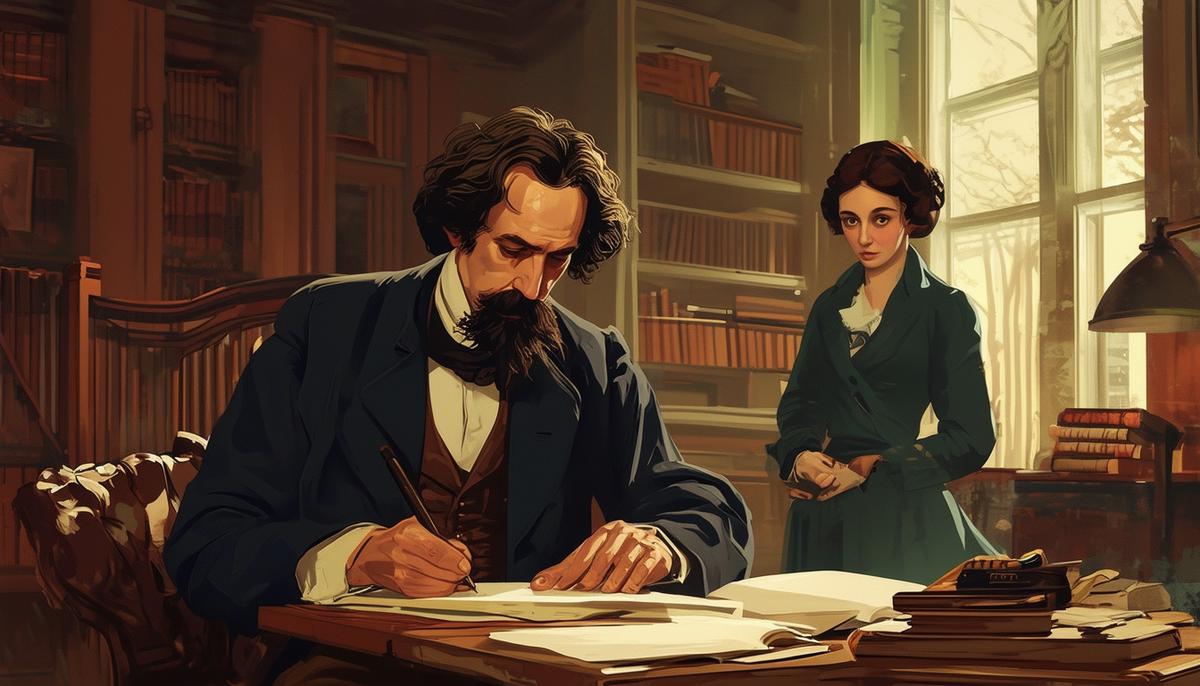
A Mysterious Visitor
As Sarah wrote about her latest time trip, someone knocked on the door. It was loud and scary in the quiet museum. She got up, feeling nervous. Visitors at this time were unusual.
She opened the door to see a tall, thin man with sharp eyes. He wore old-fashioned clothes, like he was from another time. His stare made her feel uneasy.
"Sarah, I assume?" His voice was smooth but threatening.
"Y-Yes," she said, holding the pocket watch tightly. "Who are you?"
"Dr. Elias Mortimer," he replied with a small bow. "I've been watching your… progress."
Sarah felt worried. "Progress?" she asked, trying to sound calm.
"Don't pretend," Mortimer said, looking at the watch. "The Tempus corrigere. You've used it, haven't you?"
Sarah stepped back. "I don't know what you mean."
Mortimer smiled coldly. "Oh, but you do. You've traveled through time, meeting important people from the past. But you're not the first to use its power, and not the last."
He continued, "I've been looking for this watch for years. Do you know what it can do? It can change history itself!"
Sarah was shocked. "You want to change history? Why?"
"Think about it," he said calmly. "We could stop wars, prevent disasters. Make the future perfect… my perfect future. With the Tempus corrigere, I can fix the past's mistakes."
Sarah argued, "But history isn't something to play with. It's full of lessons we need to learn."
Mortimer's face darkened. "How naive. History is written by those brave enough to take control. This watch didn't choose you because you're good. It wants someone strong enough to use it."
His eyes lit up. "Imagine a world without big wars, without diseases, without suffering. I can make that happen."
"But at what cost?" Sarah challenged. "Changing events could be very dangerous. You could ruin everything we know."
Mortimer got angry. "Enough talk. Give me the watch, or I'll take it by force."
Sarah was scared but stood firm. "No. This isn't just a thing. It's a big responsibility, and I won't let someone obsessed with playing God have it."
Mortimer glared at her. "Fine. But remember, Sarah—you won't keep it forever. I will get that watch, and I will change history how I want."
He turned and disappeared into the shadows, leaving Sarah shaken but determined. She knew now that her job wasn't just to explore, but to protect. The Tempus corrigere was more than a time machine; it was a battleground for the future of history itself.
Sarah locked the doors and went back to her desk. The pocket watch sat there, small but powerful. She needed to learn more about where it came from and how to keep it safe. Maybe her time trips would give her the answers she needed.
With new determination, Sarah got back to work. She now had more than just an object to protect—she had to guard time itself.
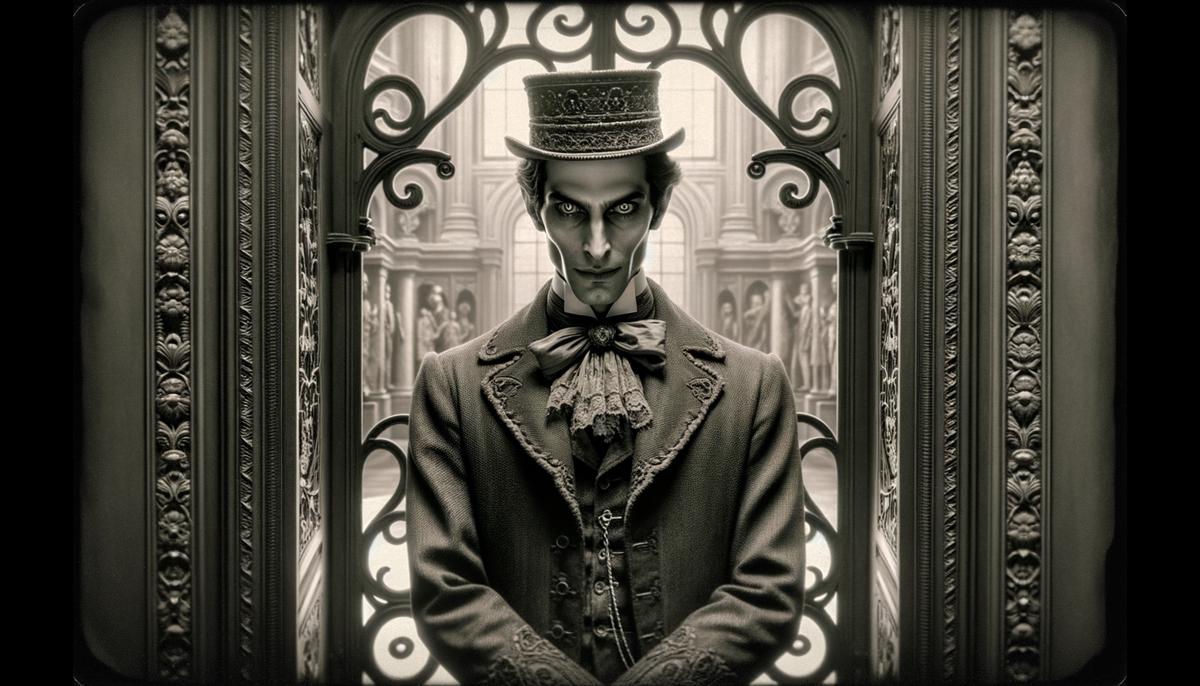
The Final Battle
Weeks passed as Sarah studied and got ready. She read old books and talked with Dr. Whittaker, learning more about the watch's power and danger. But she couldn't shake the feeling that Dr. Mortimer was waiting to attack.
One evening, the watch glowed and shook in her hand. Sarah knew another time trip was coming. She turned on the watch and felt the familiar rush as everything blurred around her.
When things cleared, she was in a green field under a cloudy sky. Important-looking men stood around a king. Sarah realized where she was: Runnymede, June 15, 1215, the day the Magna Carta would be signed.
Suddenly, Mortimer appeared beside her. "Ah, Sarah, how fitting we meet here. The Magna Carta—a key moment in history. Think of the changes we could make."
She held the watch tightly. "You can't change this, Mortimer. The Magna Carta is too important. It shaped laws for centuries."
His eyes gleamed. "Exactly why it's perfect to change. To create a world with better order."
He tried to grab the watch from her.
Sarah dodged and ran towards the crowd, hoping the watch would work better near the event it was meant to protect.
Mortimer chased her. "This ends now, Sarah," he growled. He tackled her, and they fell through the crowd.
Sarah broke free and saw King John at a table with the Magna Carta. She had an idea—if she could get close to the document and focus, maybe she could lock the event in place.
Mortimer grabbed her arm. "I won't let you ruin this!" he hissed.
Sarah threw the watch towards the table. It landed next to the Magna Carta. She focused all her thoughts on one command: Let history stay the same.
A bright light burst from the watch, covering the whole field. Sarah and Mortimer were thrown back, surrounded by flashing images of history—empires rising and falling, battles, discoveries, and cultures growing.
Sarah focused on these moments, trying to keep history in place. Mortimer tried to fight back, but his efforts were wild and unfocused.
Suddenly, the light faded. Sarah was back at Runnymede, lying on the ground. The watch hummed softly next to the Magna Carta, which glowed briefly before settling back into history.
Mortimer stood up, looking angry and defeated. "This isn't over, Sarah," he said before vanishing.
Tired but determined, Sarah got up and walked to the table. King John was signing the document, not noticing her.
She picked up the watch, feeling its warmth. She now knew for sure that the watch needed someone to protect it, not to use it for power.
As the scene started to fade, Sarah felt a new sense of duty. She would guard the Tempus corrigere, making sure it stayed a protector of time, not a tool for control.
With a last look at the historic scene, she activated the watch one more time. Back in her own time, Sarah took a deep breath in the familiar museum air.
She knew Mortimer was still out there, waiting. But for now, the Magna Carta and many other moments in history were safe. And with the watch's help, she would keep standing guard, always ready to protect the story of time itself.
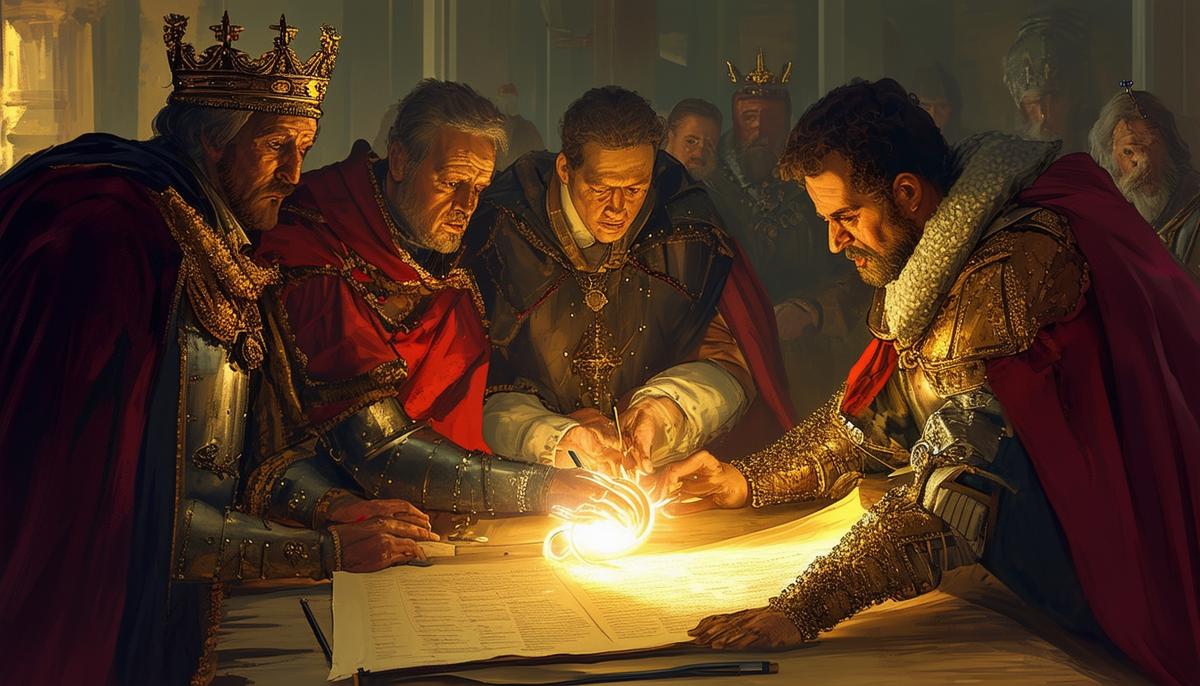
Resolution and Return
Sarah's heart raced as she returned to the museum. The quiet contrasted sharply with the chaos at Runnymede. She clutched the pocket watch tightly, feeling its warmth and power.
Unable to rest, Sarah walked to her desk. Her mind replayed the confrontation with Dr. Mortimer. His threats and obsession with changing history swirled through her thoughts.
She placed the watch in a sturdy, lockable wooden box lined with padding. The engraving tempus corrigere—"Time to correct"—now held new meaning. Sarah locked the box with a key she would hide carefully.
Over time, her life at the museum returned to normal. Yet, she carried a new respect for history and its lessons. Her talks with visitors took on a personal tone. She spoke with conviction about history as a mosaic of countless lives and stories.
One afternoon, while guiding students through a Victorian exhibit, Sarah gazed at a photo of Charles Dickens. She smiled, remembering their talk.
"Remember," she told the students, "every artifact represents someone's life, joys, and hardships. We must learn from the past and preserve its truth."
Sarah reflected on the fixed nature of history. The past shaped the present and would guide the future. She took comfort knowing Mortimer was trapped, unable to harm history further.
Glancing at the hidden box in her desk, Sarah turned to her latest project. The museum's hum felt soothing. Her life had changed, but her duty to history remained strong.
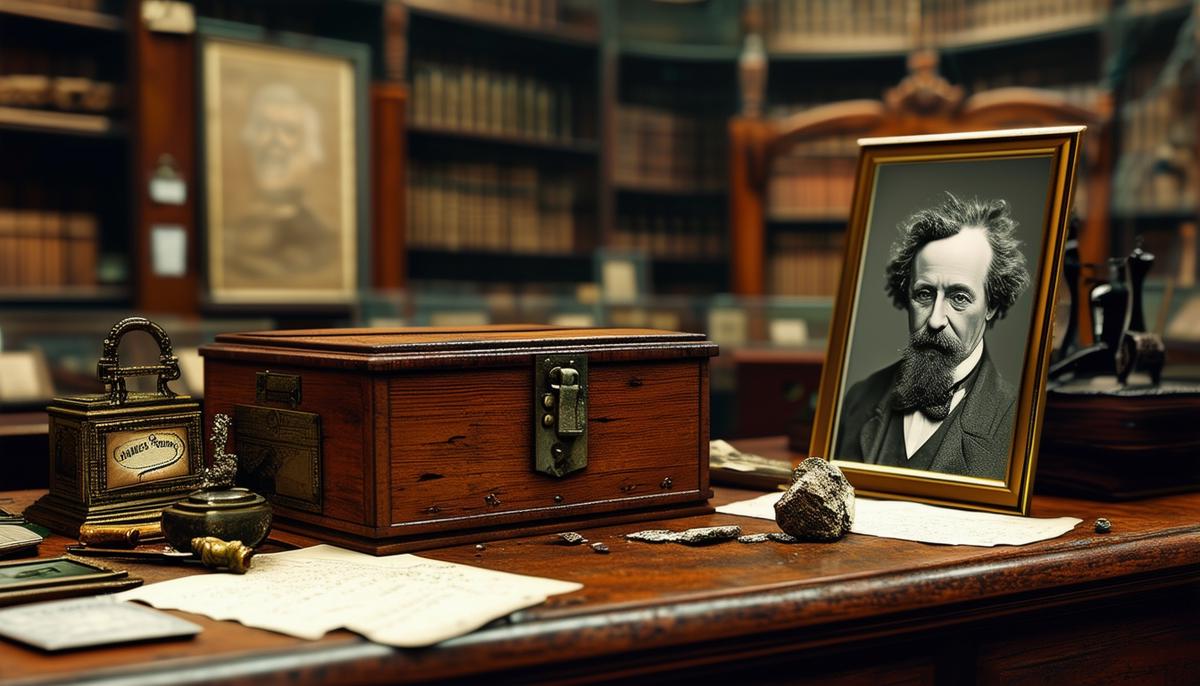
Conclusion and Reflection
As time passed, Sarah's adventures faded into memory. Yet, their impact lingered. In quiet moments, she often reflected on her journeys through time.
One evening, Sarah sat at her desk, tracing an old manuscript. "The power to travel time is a gift, but also dangerous," she thought. She remembered Victorian London, Runnymede, Renaissance Florence, and a future battlefield. History had come alive for her.
She recalled meeting Charles Dickens, Ada Lovelace, and Florence Nightingale. They were more than historical figures—they showed the enduring human spirit. Each encounter proved that history must be preserved, not rewritten.
Sarah pondered Mortimer's misguided desire to control the past. His ambition ignored history's true role as a record of humanity's journey.
"History isn't for personal gain, but for collective wisdom,"she whispered.
Her respect for artifacts had grown. Each item was a link to other times, guarding echoes of the past. She handled them with great care, aware of the lives they represented.
Sarah now understood that history's beauty lay in its unaltered state. Her role was to preserve, not change. Though her time travels had ended, her mission to protect the past continued.
As guardian of history and its secrets, Sarah knew she was where she belonged. The museum's quiet halls, filled with whispers of the past, had become her haven and life's work.
With a solemn vow, Sarah felt at peace. Her experiences had given her deep respect for history's delicate balance. She would continue her work, ever watchful, protecting the integrity of the past for future generations.
